Sensory Organs
Sensory organs are specialized parts of the body that help us perceive the world around us through various senses such as sight, hearing, touch, taste, and smell.
Types of Sensory Organs
There are five main types of sensory organs:
- Eyes (Vision): The eyes contain photoreceptor cells that help us see and perceive light and color.
- Ears (Hearing): The ears contain auditory receptors that allow us to hear and perceive sound vibrations.
- Skin (Touch): The skin contains tactile receptors that enable us to feel touch, pressure, and temperature.
- Tongue (Taste): The tongue contains taste buds that help us discern different tastes such as sweet, sour, salty, and bitter.
- Nose (Smell): The nose contains olfactory receptors that allow us to detect and distinguish various scents and odors.
Functions of Sensory Organs
The sensory organs play crucial roles in helping us interpret and understand the world around us. Their functions include:
- Receiving and detecting external stimuli
- Transmitting sensory information to the brain
- Interpreting sensory signals to create perceptions
- Helping us respond to the environment
Importance of Sensory Organs
Our sensory organs are essential for our survival and everyday experiences. They allow us to navigate our surroundings, communicate with others, and enjoy the pleasures of life through our senses.
Study Tips
To study sensory organs effectively, consider the following tips:
- Understand the structure and function of each sensory organ
- Learn about the types of receptors present in each sensory organ
- Explore how sensory information is processed and transmitted to the brain
- Practice using your senses to observe and identify stimuli in your environment
- Engage in activities that stimulate and challenge your sensory perception
◂Science Worksheets and Study Guides Fourth Grade. Animal Growth and Reproduction
Study Guide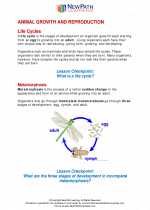 Animal Growth and Reproduction
Animal Growth and Reproduction  Activity Lesson
Activity Lesson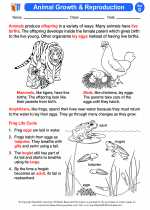 Animal Growth & Reproduction
Animal Growth & Reproduction  Worksheet/Answer key
Worksheet/Answer key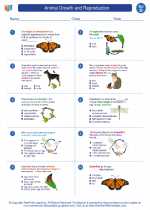 Animal Growth and Reproduction
Animal Growth and Reproduction  Worksheet/Answer key
Worksheet/Answer key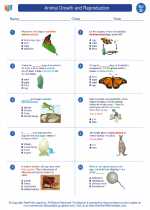 Animal Growth and Reproduction
Animal Growth and Reproduction  Worksheet/Answer key
Worksheet/Answer key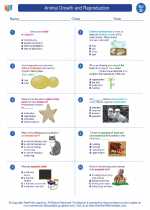 Animal Growth and Reproduction
Animal Growth and Reproduction  Worksheet/Answer key
Worksheet/Answer key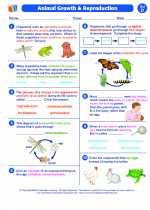 Animal Growth and Reproduction
Animal Growth and Reproduction  Vocabulary/Answer key
Vocabulary/Answer key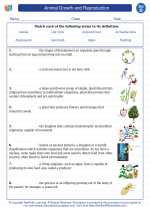 Animal Growth and Reproduction
Animal Growth and Reproduction  Vocabulary/Answer key
Vocabulary/Answer key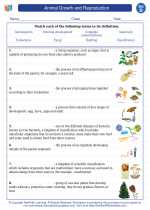 Animal Growth and Reproduction
Animal Growth and Reproduction  Vocabulary/Answer key
Vocabulary/Answer key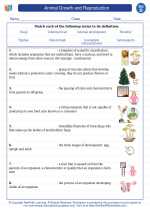 Animal Growth and Reproduction
Animal Growth and Reproduction  Vocabulary/Answer key
Vocabulary/Answer key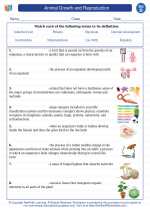 Animal Growth and Reproduction
Animal Growth and Reproduction  Vocabulary/Answer key
Vocabulary/Answer key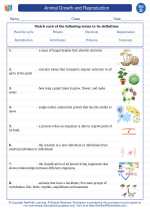 Animal Growth and Reproduction
Animal Growth and Reproduction 

 Activity Lesson
Activity Lesson
 Worksheet/Answer key
Worksheet/Answer key
 Worksheet/Answer key
Worksheet/Answer key
 Worksheet/Answer key
Worksheet/Answer key
 Worksheet/Answer key
Worksheet/Answer key
 Vocabulary/Answer key
Vocabulary/Answer key
 Vocabulary/Answer key
Vocabulary/Answer key
 Vocabulary/Answer key
Vocabulary/Answer key
 Vocabulary/Answer key
Vocabulary/Answer key
 Vocabulary/Answer key
Vocabulary/Answer key

The resources above cover the following skills:
Life Science
Heredity and Reproduction - A. Offspring of plants and animals are similar to, but not exactly like, their parents or each other. B. Life cycles vary among organisms, but reproduction is a major stage in the life cycle of all organisms.
Compare and contrast the major stages in the life cycles of Florida plants and animals, such as those that undergo incomplete and complete metamorphosis, and flowering and nonflowering seed-bearing plants.